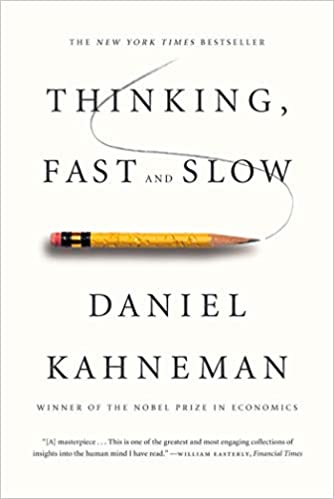A phenomenal product and a fantastic team aren’t everything you need to kick your company off the ground and launch it to stardom. But, as an entrepreneur, planning every step of the way is part of the job. And in order to learn how to come up with an extraordinary plan in just one day, keep reading!

Thinking Fast and Slow
by Daniel Kahneman
⏱ 12 minutes reading time
🎧 Audio version available
Let’s define a strategic plan first. A strategy is a set of choices or steps that are meant to guide the company to progress and reach its long-term goals, as well as give you an advantageous angle.
So a strategic plan is what you set when you, your partners, your coworkers, and your stakeholders sit down together and mush your minds together to decide how you’re going to make your company a win.
A brainstorming session is the first crucial step in improving your business. In fact, it’s the basis, the foundation, of any successful brand.
During the course of this session, a few of the things you’re doing to do and go over include the following:
- Highlight the definition of what you want your company to be in the upcoming years.
- Outlining goals and key results (Objectives) and (KPIs).
- Giving each employee a responsibility.
- Ensuring the employees understand the Objectives and KPIs and accept them.
Apply Structure
The term “brainstorming session” brings forth an image of geniuses gathered in a room, shouting ideas out at a person in front of a whiteboard. The reality, while very similar, isn’t quite that. An effective brainstorming that ends with a strategic plan all mapped out needs structure.
Of course, interesting discussions, arguments, or ideas can be proposed during brainstorming, but in this particular one, they can derail the session off its course as they don’t have a clear direction in mind.
That’s why such sessions need a measurable outcome. In addition, before heading in, you’ll need to know what the topics that need to be discussed are. Most importantly, applying a time limit is of utmost importance.
An ordinary brainstorming meeting that generates the most ideas possible usually lasts around 15 to 45 minutes, with 30 minutes being the most recommended number.
However, since this is to develop a strategic plan, it could last a little longer. So make sure to not stray out of the time frame as much as possible.
Develop Three Understandings
What are the three understandings that need to emerge from this meeting? If you’re dealing with several employees, they need to walk away from that session knowing:
- What needs to be done according to the strategy.
- Why it needs to be done.
- How to do it.
As the leading entrepreneur or facilitator of this session, to get ahead and be a little more organized, answer these questions yourself before bringing them up for discussion.
Assign Roles For Each Person
Before you dive deep into the questions, one essential step to keep things from getting too chaotic is assigning roles for each person. This works better than asking everyone to do a little of everything. This way, each employee is well aware of their responsibility and can apply themselves accordingly.
The roles should include a leader, a time tracker, and a note-taker.
The leader– it goes without saying– is responsible for leading the strategic planning session. It falls onto their shoulders to keep the meeting organized, that the goals are being met, and that group discussions are efficient. They should also make sure everyone gets their chance to speak.
The time tracker holds the clock. They ensure the sessions are running on time and in line with each meeting’s agenda. They also make sure that discussions stay within a time frame.
Lastly, the note taker jots down all the important ideas and talking points. Then, after the meeting, they’re in charge of sending detailed notes to each employee that participated.
Points To Go Over
Every leader needs some guidelines of points they should go over in order to develop a complete strategic plan for their company. So here are some helpful questions: what’s the company’s ultimate purpose? Next, what is the company’s SWOTSs– which we’ll explain later. Then how will your company compete in the market, followed by your company’s KPIs?
Let’s break things down even further, starting with the company’s purpose.
While strategic planning is a bottom-up method, you do need to start with the end in mind. What is the ideal scenario here? The ultimate goal of your organization? Stating it clearly will boost morale in the meeting and guide the upcoming planning decisions.
Next, you want to pose this question to the room: what are the company’s SWOTs?
SWOTs stands for Strengths, Weaknesses, Opportunities, Threats. This is a cornerstone of sessions like these. A SWOT analysis gives you a chance to realize what your company is particularly talented at– and by extension, what you should capitalize on.
By identifying your weaknesses, you’re identifying where your company needs to improve.
When you specify opportunities, you’re mapping out external factors that may benefit you. Threats are, of course, other external factors, but ones that can harm your company.
The next question is, where will your company compete in the market? Take a look at the competitive market and find which niches you can burrow in and conquer.
No company can aim to compete in every single field. A successful, smart one knows that all they need is a specific, sustainable audience.
How the company will compete is the follow-up question. Once you’re in their market, target audience in mind, what’s your tactic? How will you approach your customers?
It’s during brainstorming sessions that all these decisions have to be made.
Finally, answer this question: what is the company’s KPIs? KPIs stand for Key Performance Indicators; or in other words, key results.
Mapping out key results is the heart of each session. Otherwise, all this hard work you’re putting in is worthless. By specifying your KPIs, your team knows which objectives to follow and which take precedence.
What Is Snapreads?

With the Snapreads app, you get the key insights from the best nonfiction books in minutes, not hours or days. Our experts transform these books into quick, memorable, easy-to-understand insights you can read when you have the time or listen to them on the go.


